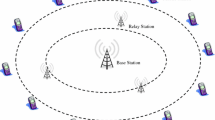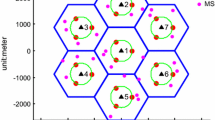Abstract
In this article, the problem of downlink subcarrier allocation in a cooperative wireless multiuser OFDM system is investigated. We consider a single-cell where all the users are paired in cooperative groups. The mobile users in each group amplify and forward their partner’s data stream using a time division protocol. Based on the capacity contribution from the relaying terminal, a new parameter called cooperation coefficient is introduced as a function of the relaying subchannel. This parameter is used to modify the objective parameter of the subcarrier allocation procedure. Fairness-oriented and throughput-oriented algorithms are selected from the literature to test the proposed technique. Both algorithms are modified to employ the mean of cooperation coefficient in the objective parameter of the subcarrier allocation procedure and shown to have a better total throughput without any sacrifice. Using the mean of cooperation coefficient eliminates the need for the feedback of the relaying channel to the base station. It is shown that by using the mean value of the cooperation coefficient, instead of its instantaneous value, throughput of the system would still improve compared to the non-cooperative case. Using the mean of cooperation coefficient leads to an implementable cooperative subcarrier allocation algorithm.
Similar content being viewed by others
References
Laneman J., Wornell G. (2003) Distributed space-time-coded protocols for exploiting cooperative diversity in wireless networks. IEEE Transactions on Information Theory 49: 2415–2425
Laneman J., Tse D., Wornell G. (2004) Cooperative diversity in wireless networks: Efficient protocols and outage behavior. IEEE Transactions on Information Theory 50: 2415–2425
Wong C. Y., Cheng R. S. (1999) Multiuser ofdm with adaptive subcarrier, bit and power allocation. IEEE Journal on Selected Areas in Communication 17: 1747–1758
Sendonaris, A., Erkip, E., & Aazhang, B. (1998). Increasing uplink capacity via user cooperation diversity. IEEE Symposium on Information Theory (p. 156).
Sendonaris A., Erkip E., Aazhang B. (2003) User cooperation diversity—part i: System description. IEEE Transactions on Communications 51: 1927–1938
Sendonaris A., Erkip E., Aazhang B. (2003) User cooperation diversity—part ii: Implementation aspects and performance analysis. IEEE Transactions on Communications 51: 1939–1948
Nabar R., Bolcskei H., Kneubuhler F. (2004) Fading relay channels: Performance limits and space-time signal design. IEEE Journal on Selected Areas in communications 22: 1099–1109
Anghel P., Kaveh M. (2003) Multi-user space-time coding in cooperative network. IEEE ICASSP 4: 73–76
Anghel P., Kaveh M. (2006) On the performance of distributed space-time coding systems with one and two non-regenerative relays. IEEE Transactions on Wireless Communications 5: 682–692
Jang J., Lee K. B. (2003) Transmit power adaptation for multiuser ofdm systems. IEEE Journal on Selected Areas in Communications 21: 171–178
Yin H., Liu H. (2000) An efficinet multiuser loading algorithm for ofdm-based broadband wireless systems. In Proceeding IEEE Globecom 1(10): 103–107
Rhee, W., & Cioffi, J. M. (2000). Increase in capacity of multiuser ofdm system using dynamic subchannel allocation. Proceeding IEEE International Vehicular Tehcnology Conference (Vol. 2, pp. 1085–1089).
Shen Z., Andrews J. G., Evans B. L. (2003) Optimal power allocation in multiuser ofdm systems. Proceeding IEEE Globecom 1: 337–341
Soldani, D., & Dixit, S. (2008). Wireless relays for broadband access. IEEE Communications Magazine (pp. 58–66).
Pabst R. et al (2004) Relay-based deployment concepts for wireless and mobile broadband radio. IEEE Communications Magazine 42: 80–89
Rasouli, H., Sadr, S., & Anpalagan, A. (2008). A fair subcarrier allocation algorithm for cooperative multiuser ofdm systems with grouped users. IEEE Global Communication Conference December 2008.
Proakis J. G. (2001) Digital communications. McGrall Hill, New York
Papoulis A., Pillai S. (2002) Probablity, random variables, and stochastic processes. Mc-Graw Hill, New York
Shen Z., Andrews J., Evans B. (2005) Adaptive resource allocation in multi-user ofdm system with proportional rate constrains. IEEE Transactions on Wireless Communications 4: 2726–2737
Chow P. S., Cioffi J. M. (1992) Bandwidth optimization for high speed data transmission over channels with severe intersymbol interference. Proceeding IEEE Globecom 1: 59–63
Author information
Authors and Affiliations
Corresponding author
Rights and permissions
About this article
Cite this article
Rasouli, H., Anpalagan, A. Cooperative Subcarrier Allocation for an OFDM Relaying System with Grouped Users. Wireless Pers Commun 60, 751–767 (2011). https://doi.org/10.1007/s11277-010-9972-0
Published:
Issue Date:
DOI: https://doi.org/10.1007/s11277-010-9972-0




